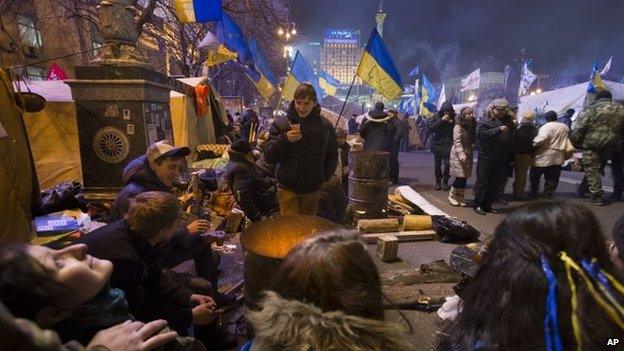Russia offers Ukraine major economic assistance
- Published
Protesters in Ukraine are concerned about what Mr Yanukovych has offered in return, as Daniel Sandford reports
Russia has given Ukraine a discount of almost a third on Russian gas and said it would buy billions of dollars' worth of Ukrainian government bonds.
The moves come amid Russian attempts to stop Ukraine moving towards the EU.
Russian President Vladimir Putin and Ukrainian President Viktor Yanukovych said they had not discussed Ukraine joining a Moscow-led customs union.
Ukrainian opposition leaders have demanded to know what Mr Yanukovych has offered Moscow in return for the deal.
As protests continued in Kiev over the deepening ties with Russia, opposition leader and boxing champion Vitali Klitschko said he suspected Mr Yanukovych had handed over Ukrainian firms and strategic assets in return for Russian help.
Mr Klitschko told protesters in Independence Square that he wanted early elections and to meet Mr Yanukovych "in the ring".
Although details of the deal are unclear, Oleh Tyahnybok, leader of an opposition far-right group, said Mr Yanukovych had "pawned whole sectors" of the country's economy to Russia.
After talks between Mr Putin and Mr Yanukovych in the Kremlin, it was announced Russia would buy $15bn-worth (£9.2bn; 10.9bn euros) of Ukrainian government bonds.
The cost of Russian gas supplied to Ukraine has been slashed from more than $400 (£245; 291 euros) per 1,000 cubic metres to $268.5.
Mr Putin said the assistance was not "tied to any conditions".
Both of the latest measures are intended to ease Ukraine's financial woes at a time when the country is struggling to avoid default, the BBC's Steven Rosenberg reports from Moscow.
While the two leaders did not discuss Ukraine joining the Russian-led customs union, they did speak about a strategic partnership and signed a raft of agreements on economic and industrial co-operation, our correspondent adds.
The measures certainly appear to tie Ukraine closer to Russia, and helps the Kremlin achieve its geopolitical aim of preventing Ukraine from drifting from its orbit, he says.
Mr Yanukovych's U-turn on an EU association agreement deal last month sparked mass demonstrations.
He admitted his decision had been influenced by heavy pressure from Russia.
The current protests, the largest since Ukraine's 2004 Orange Revolution, are pushing for the resignation of Mr Yanukovych and his government, and snap elections.
Correspondents say many Ukrainians will be worried about what may have been agreed between Mr Yanukovych and Mr Putin in exchange for the latest assistance.

Pro-EU activists are out in force in Kiev once again
Gas bill
The gas agreement signed between Russia's Gazprom and Ukraine's Naftogaz amends a controversial 2009 deal signed by former Ukrainian Prime Minister Yulia Tymoshenko, for which she was jailed two years ago.
Ukraine relies on imports of Russian gas - and heavy energy-intensive industries in eastern Ukraine are especially anxious to keep the price of gas down. Some 75% of Ukraine's engineering exports go to Russia.
"Russia and Ukraine are... united both by many centuries of our friendship and by having lived a long time together in the same country," Mr Putin said.
Trade between the two countries, he said, had dropped over the past two years, by 11% in 2012 and 14.5% this year.
"It is of course time to take vigorous action not only to return to the level of previous years, but also create conditions for moving forward," he added.
Mr Yanukovych said Ukraine would work with Russia and other ex-Soviet states to implement the free trade deal they signed two years ago.
With talks on resuming credit from the International Monetary Fund stalled, Ukraine requires urgent financial assistance in the coming months to keep the economy afloat.
Kiev also needs to find about $1.7bn next year to pay its outstanding gas bill to Russia.
Meanwhile, EU foreign ministers on Monday used a high-level meeting to reassure Russia that the association agreement with Ukraine, external would not undermine Moscow's interests.
Supporters say closer ties with the EU could make the economy more open, transparent and prosperous, with greater competition and protection for investors.
But the EU partnership requires far-reaching and expensive reforms, which the government says would put at risk many enterprises reliant on trade with Russia.
Moscow has already put economic pressure on Ukraine, with customs delays and a ban on Ukrainian chocolates, and could escalate such measures.
Russia fears that such a deal would damage the country's economy by letting in a massive flow of EU products via Ukraine.
Moscow wants Kiev to join the customs union instead of signing the EU pact.
The Russian-led union now also includes Belarus and Kazakhstan, but pro-EU protesters regard the grouping as a modern embodiment of the Soviet Union.
Mr Yanukovych has said he eventually aims to sign the EU deal, but wants at least 20bn euros a year to pay for the necessary upgrading of Ukraine's economy.